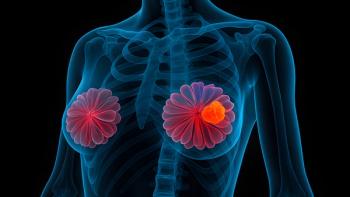
- March 2016
- Volume 10
- Issue 2
Not So Pretty in Pink
Men newly diagnosed with breast cancer need a great deal of support, in part because of how rare breast cancer is in men, and because the typical reaction to a breast cancer diagnosis is one of disbelief.
The man stands at the counter in the Breast Center at my local community hospital, and before he has a chance to speak, the receptionist points to the door and tells him that the hospital and testing registration areas are down the hall. I’m waiting to have a mammogram, and hear the man say that he, too, is scheduled for a mammogram. A few minutes later, we both are dressed in pink flowered gowns as we sit in the mammography waiting area, which has pink-striped wallpaper, pink chairs, and even pink carpet. The man is visibly uncomfortable here, and tells me that he went to a surgeon to remove what he thought was a cyst, but the surgeon suspects breast cancer. “I didn’t even think men could get breast cancer,” he adds.
Breast cancer is rare among men; only 1% of all breast cancers occur in men. However, the American Cancer Society estimates that 2600 men will be diagnosed with breast cancer in 2016 and 440 men will die from the disease. For men, the lifetime risk of getting breast cancer is 1 in 1000, whereas for women, it’s about 1 in 8. This rate increases in men with genetic mutations to 1% to 5% with BRCA1 and 5% to 10% with BRCA2 mutations.
Men generally don’t consider themselves at risk for breast cancer; consequently, it’s not unusual for men to be diagnosed with a more advanced cancer compared with women diagnosed with breast cancer. Men also have a shorter life expectancy after a breast cancer diagnosis.
While women typically choose lumpectomies for breast cancer, a lumpectomy is usually not an option for men because their tumors most commonly occur behind the nipple in an area with little breast tissue. Most men also don't have reconstructive surgery after a mastectomy. Nipple reconstructive surgery is available, but men may not be aware of this option. Although diagnosis and treatment of male breast cancer is similar to the diagnosis and treatment of female breast cancer, the experience of breast cancer among men is very different.
Mammography facilities need procedures for performing mammograms on men that recognize the need for sensitivity. Having men enter the imaging area from a side door, providing gender-neutral gowns, and avoiding waiting areas decorated in pink and filled with women are simple strategies that can reduce men’s unease.
Men newly diagnosed with breast cancer need a great deal of support, in part because of how rare breast cancer is in men, and because the typical reaction to a breast cancer diagnosis is one of disbelief. Even clinicians may shy away from intervening because of their unfamiliarity with male breast cancer. Referral to breast cancer support groups may actually not be helpful and may change the dynamic of the group, which is typically all female. However, there are resources available to men with breast cancer. The website
The organization
Because of the rarity of breast cancer in men, it’s often difficult for men to locate a support group for men or find a “buddy” who has been diagnosed with the same disease. Men with breast cancer can connect online with other men with breast cancer by visiting the discussion board forum “Male Breast Cancer” at www.Breastcancer.org.
Historically, research on breast cancer has only involved women, which limits how research findings can be applied to men with breast cancer. Fortunately, research on the causes, prevention, and treatment of breast cancer in men is now under way in many facilities around the world.
Lisa Schulmeister, MN, RN, ACNS-BC, FAAN is an oncology nursing consultant and editor-in-chief of Oncology Nursing News.
Articles in this issue
over 9 years ago
Why I Am Passionate About Navigationover 9 years ago
When You Hear Hoof Beats, Think Zebrasover 9 years ago
Urgent Visit Program Aims to Reduce ED Admissionsover 9 years ago
Understanding Neuroendocrine Tumors and Carcinoid Syndromealmost 10 years ago
What I Wish My Nurse Knew About Anal Canceralmost 10 years ago
Diagnosing and Treating Myeloproliferative NeoplasmsNewsletter
Knowledge is power. Don’t miss the most recent breakthroughs in cancer care.
















































































